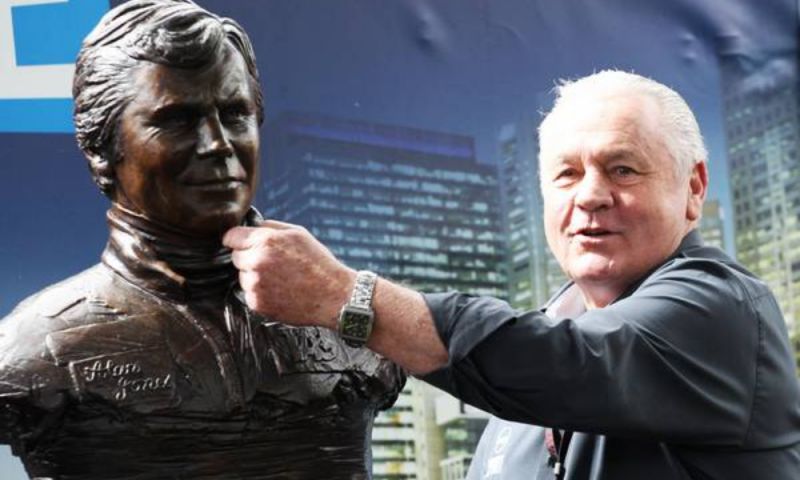Jones with a statue of himself at the unveiling in Melbourne in 2013
F1 News

GPBlog's Top 50 drivers in 50 days - #39 - Alan Jones
We’re getting closer day by day to the return of racing and the Australian Grand Prix on March 15, and we’re now just 39 days away! So let’s continue our countdown of our top 50 F1 drivers of all time. If you need to catch up on yesterday’s piece on Jacky Ickx then do so before we begin talking about Alan Jones…
Alan Jones’ story is one of a hard-working guy who gave it all to make it to the top and he made it work no matter what was thrown at him.
Battling sponsorship problems during his career in the lower classes, he eventually managed to gain the money to enter F1 in a privately owned Hesketh.
The Hesketh was uncompetitive and Jones failed to score a point in it, but it did put him in the shop window for other teams, and he signed for Graham Hill’s Embassy Racing team, scoring his first points in F1 at the 1975 German Grand Prix.
Jones signed with the Surtees team for 1976 and had more success, scoring points on three occasions. He opted not to sign with the team for the following year, instead looking for a better drive and was left without one as the season started.
Following the tragic and freakish death of Tom Pryce at the South African Grand Prix, Jones was called in to replace him at the Shadow team.
Later that year in Austria, Jones took his first F1 victory from P14 on the grid and a podium two races later in Italy showed he was not in F1 just to make up the numbers.
He moved to the new Williams outfit for 1978 and after a disappointing season, 1979 rewarded his patience as he won four of the last six races, a charge too late to steal the title but he did show what was to come.
The following year Jones took it to the next level and was trailing Nelson Piquet by just one point heading into the final two rounds. Jones won both races in Canada and the USA and took the title.
He managed to finish on the podium in all but one of the races he finished and was pretty much unstoppable when he was on form.
1981 started well for Jones but a run of poor results saw him drop off the pace of the title battle between Piquet and Carlos Reutemann.
He opted to retire at the end of the season, winning his final race for Williams at the season ender at Caesers Palace in Las Vegas.
As F1 drivers often do, Jones came out of retirement to race for Arrows in 1983 although he raced just once.
In 1985 he made another comeback with Team Haas (nothing to do with today’s Haas). It wasn’t successful and Jones finally retired for good at the end of 1986.
A career that went from nowhere to the top, Jones’ story is one that shows hard work pays off as he became just the second Australian to win the F1 world title.